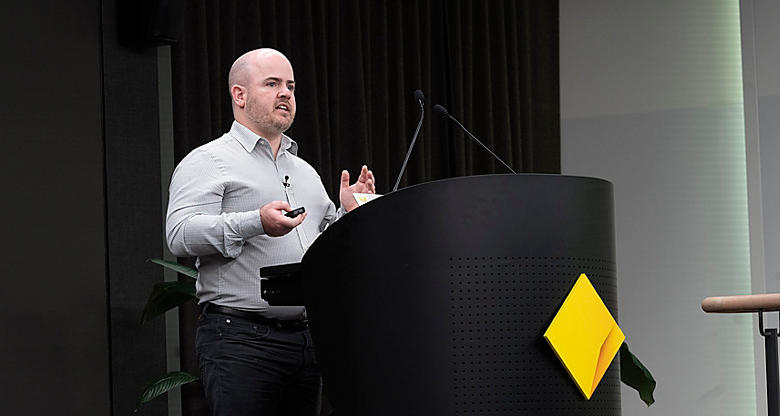Consumers produce a staggering amount of data each year. Current government estimates anticipate that between 2021 and 2025, roughly 176 zettabytes of new data will be created annually. Each zettabyte is equivalent to a trillion gigabytes – or, as the Australian Data Strategy puts it, “about 250 billion DVDs”.
Businesses have a tremendous opportunity to harness their data to provide better customer experiences and outcomes – whilst taking a multi-pronged approach to data privacy, security and data protection, Commonwealth Bank Chief Decision Scientist Dan Jermyn says.
“Business owners want the same things from AI that they want from any other service or innovation they introduce into their business – they want to serve customers better and improve the way their business operates,” he says.
“In that regard, AI is really no different to any other tool. What is different about it is the way in which it helps and the opportunities it opens that weren’t possible previously.”
A very useful tool
While there are a multitude of ways AI can help businesses, Mr Jermyn highlights two major benefits:
- Processing and interpreting large data sets to produce new insights or tools.
- Reducing the amount of repetitive busy-work staff need to complete each day.
Used correctly, AI tools can drastically improve customer experience by simplifying the sales process, tailoring marketing towards their specific needs, and generally improving engagement.
For employees, AI can automate lower-value tasks in their day-to-day roles, freeing them up to focus the parts of their job that generate the most value for the business.
“For us at CommBank, our first AI tool – and it's still our big flagship AI implementation – is our customer engagement engine,” Mr Jermyn says.
“This helps us manage the way we communicate with our customers through all of our channels, including our frontline.
“If you are a customer of the bank, we'll understand your needs to determine what products and services are the most relevant and helpful for you at that time, and this capacity exists across both our digital channels and people-enabled channels.”
The bank has had similar successes with its ‘Benefits finder’ – a tool that connects both personal and business banking customers with any grants, rebates or concessions they may be entitled to by asking a handful of simple questions.
Benefits finder was launched in 2019 and has since connected customers to $1 billion in benefits.
These tools have been built and optimised through the Commonwealth Bank’s strong partnerships with H2O.ai.
Know how to use it
While AI has the potential to vastly improve customer experiences and outcomes, it very much depends on its proper use, Mr Jermyn says. Customers need to be able to trust the systems they’re interacting with, and businesses need to know their systems aren’t misinterpreting data and accidentally discriminating against users.
“One of the most important aspects of AI is responsible use,” Mr Jermyn says.
“AI can be very complex and with that can come an uncertainty about exactly how it's working, so anybody who's thinking about applying an AI system has to be able to understand how it works and to be able to explain the outcomes that they're getting.”
Safe and effective use of AI starts with two core principles, Mr Jermyn says. They are:
- Transparency – Businesses using AI need to see how the underlying technology is working and understand how the algorithms underpinning the technology make their decisions.
- Explainability – Understanding how an AI model works isn’t enough on its own. Businesses also need to be able to explain it simply to customers.
These two principles form the bedrock of responsible AI use, but there are other steps businesses should take to ensure their AI systems are effective.
The first is to test for unintended biases. By design, AI algorithms are supposed to discriminate between the different options presented to it – otherwise its decision-making would be left to chance. That in itself is not a problem.
Where problems do arise, however, is when those algorithms discriminate in ways that are unfair to certain customers.
Businesses developing their own AI tool internally need to factor these possibilities into their risk control environment, Mr Jermyn says, and test for unfair discrimination as part of the model’s release process.
Anyone using an off-the-shelf or third-party AI tool needs to ask their supplier for documentation showing how the system operates and take the time to ask questions and look for possible weaknesses.
Finally, Mr Jermyn says there needs to be a chain of accountability when using AI tools.
“The most important advice that you can give to any business is to make sure that you are always keeping humans accountable, exactly as you would with any other type of technology that you were using,” he says.
“AI is an incredible tool, but it's just a tool.
“Humans have to make decisions about whether it is right to use it or not, what it's doing, and whether that aligns to the core values of the business itself.”
Our AI expert
Dan Jermyn
Dan Jermyn is an experienced leader in both technology and analytics, with an established record of building award-winning, global teams in digital, big data and customer decisioning. Dan joined the Commonwealth Bank of Australia in 2017, where he has responsibility for ensuring they harness specialisms in AI, data science, experimentation, and behavioural economics to drive decisions that help improve the financial wellbeing of CBA’s customers and communities.
After gaining master’s degrees from both Oxford University and Cardiff University, Dan first plied his trade as a strategy consultant and then Head of Analytics for an agency in the UK, where he led engagements with a host of major corporate and governmental organizations. He followed this up by co-founding a successful digital technology start-up. Dan joined CBA from the Royal Bank of Scotland, where he held various roles including Head of Digital Analytics and Head of Big Data & Innovation.

